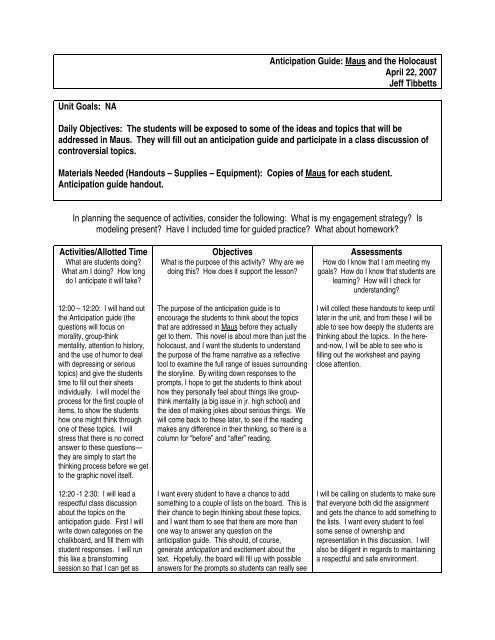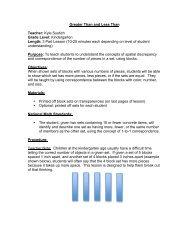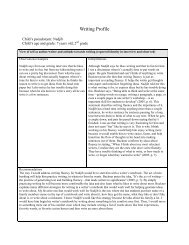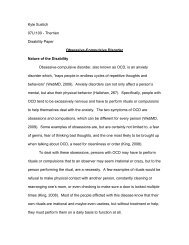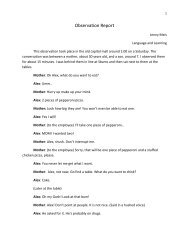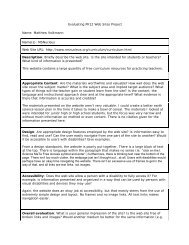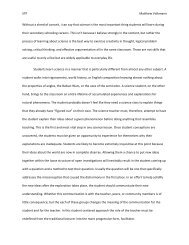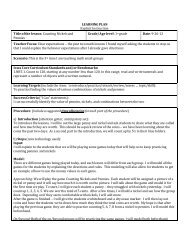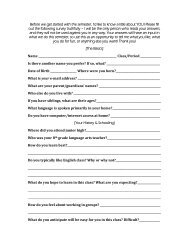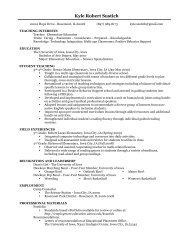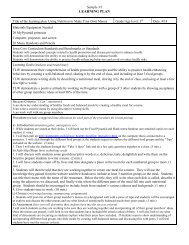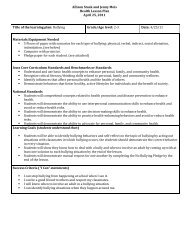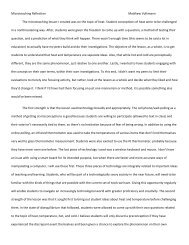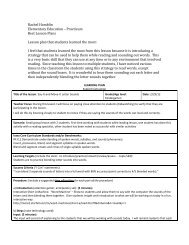Anticipation Guide Lesson Plan - Employment
Anticipation Guide Lesson Plan - Employment
Anticipation Guide Lesson Plan - Employment
Create successful ePaper yourself
Turn your PDF publications into a flip-book with our unique Google optimized e-Paper software.
Unit Goals: NA<br />
<strong>Anticipation</strong> <strong>Guide</strong>: Maus and the Holocaust<br />
April 22, 2007<br />
Jeff Tibbetts<br />
Daily Objectives: The students will be exposed to some of the ideas and topics that will be<br />
addressed in Maus. They will fill out an anticipation guide and participate in a class discussion of<br />
controversial topics.<br />
Materials Needed (Handouts – Supplies – Equipment): Copies of Maus for each student.<br />
<strong>Anticipation</strong> guide handout.<br />
In planning the sequence of activities, consider the following: What is my engagement strategy? Is<br />
modeling present? Have I included time for guided practice? What about homework?<br />
Activities/Allotted Time<br />
What are students doing?<br />
What am I doing? How long<br />
do I anticipate it will take?<br />
12:00 – 12:20: I will hand out<br />
the <strong>Anticipation</strong> guide (the<br />
questions will focus on<br />
morality, group-think<br />
mentality, attention to history,<br />
and the use of humor to deal<br />
with depressing or serious<br />
topics) and give the students<br />
time to fill out their sheets<br />
individually. I will model the<br />
process for the first couple of<br />
items, to show the students<br />
how one might think through<br />
one of these topics. I will<br />
stress that there is no correct<br />
answer to these questions—<br />
they are simply to start the<br />
thinking process before we get<br />
to the graphic novel itself.<br />
12:20 -1 2:30: I will lead a<br />
respectful class discussion<br />
about the topics on the<br />
anticipation guide. First I will<br />
write down categories on the<br />
chalkboard, and fill them with<br />
student responses. I will run<br />
this like a brainstorming<br />
session so that I can get as<br />
Objectives<br />
What is the purpose of this activity? Why are we<br />
doing this? How does it support the lesson?<br />
The purpose of the anticipation guide is to<br />
encourage the students to think about the topics<br />
that are addressed in Maus before they actually<br />
get to them. This novel is about more than just the<br />
holocaust, and I want the students to understand<br />
the purpose of the frame narrative as a reflective<br />
tool to examine the full range of issues surrounding<br />
the storyline. By writing down responses to the<br />
prompts, I hope to get the students to think about<br />
how they personally feel about things like groupthink<br />
mentality (a big issue in jr. high school) and<br />
the idea of making jokes about serious things. We<br />
will come back to these later, to see if the reading<br />
makes any difference in their thinking, so there is a<br />
column for “before” and “after” reading.<br />
I want every student to have a chance to add<br />
something to a couple of lists on the board. This is<br />
their chance to begin thinking about these topics,<br />
and I want them to see that there are more than<br />
one way to answer any question on the<br />
anticipation guide. This should, of course,<br />
generate anticipation and excitement about the<br />
text. Hopefully, the board will fill up with possible<br />
answers for the prompts so students can really see<br />
Assessments<br />
How do I know that I am meeting my<br />
goals? How do I know that students are<br />
learning? How will I check for<br />
understanding?<br />
I will collect these handouts to keep until<br />
later in the unit, and from these I will be<br />
able to see how deeply the students are<br />
thinking about the topics. In the hereand-now,<br />
I will be able to see who is<br />
filling out the worksheet and paying<br />
close attention.<br />
I will be calling on students to make sure<br />
that everyone both did the assignment<br />
and gets the chance to add something to<br />
the lists. I want every student to feel<br />
some sense of ownership and<br />
representation in this discussion. I will<br />
also be diligent in regards to maintaining<br />
a respectful and safe environment.
wide a range of responses as<br />
possible.<br />
12:30 – 12:45: We will use<br />
the topics on the board to<br />
steer conversation to any<br />
subject that takes their<br />
interest. I will try to work in<br />
ways to relate the text that we<br />
are about to read to the topics,<br />
so that students can clearly<br />
see where we’re headed.<br />
12:45 – 12:55: I will hand out<br />
copies of Maus, and give the<br />
students a chance to flip<br />
through it and check out the<br />
artwork. I will answer<br />
questions and talk a little bit<br />
about the author if there is<br />
time.<br />
the range of possible reactions.<br />
This gives the students a chance to spend a little<br />
more time on the subjects that prove to be more<br />
controversial or just plain interesting. I will be able<br />
to see what is on the minds of the students and<br />
determine what topics I may want to give special<br />
attention to later on. This also allows the students<br />
to take some ownership for their reading of the<br />
text, because they may want to defend one<br />
position or another or see how the text deals with<br />
the issue.<br />
This obviously gives the students a chance to take<br />
a look at this text. This may or may not be a very<br />
novel text for them, and I expect some people in<br />
class to have a few questions. I will try to talk<br />
about the author if I have time, mentioning the<br />
influence of this particular book as well as the<br />
critical acclaim it has received. I want them to<br />
respect this as much as they would a conventional<br />
novel.<br />
Again, I will be calling on students to<br />
make sure that multiple viewpoints are<br />
addressed. And also, I will of course be<br />
stressing that respectful disagreement is<br />
okay in my class, but there are<br />
boundaries to be maintained.<br />
I will by watching for those puzzled<br />
glances, and try to root out the source of<br />
any confusion. It should be obvious who<br />
is paying attention to the task.<br />
Differentiation The anticipation guide will serve as a helpful scaffold around which the students can solidify their opinions,<br />
and even identities. The students will have ample time to fill out the sheets, and they may continue to work on them during our<br />
brainstorming/discussion sessions should they need it. The discussion itself should have plenty of opportunity to get into fairly<br />
concrete thoughts as well as more complex or abstract concepts. This should give each student something that they can<br />
discuss. I want all students to participate in this discussion, so I will make sure that I am getting around to as many levels and<br />
interests as are appropriate.<br />
Reflection. Answer the following after preparing the lesson: What was the most difficult part of planning this<br />
lesson? What part are you most proud of? Most unsure of? What are you learning about yourself as a planner? Answer the<br />
following after teaching the lesson: How did the lesson go? What worked? What would I rethink next time? What did I learn<br />
from this lesson?


